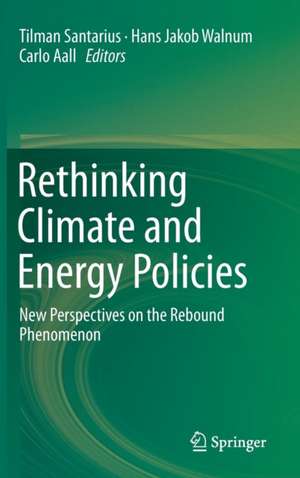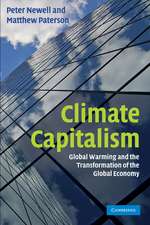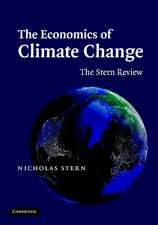Rethinking Climate and Energy Policies: New Perspectives on the Rebound Phenomenon
Editat de Tilman Santarius, Hans Jakob Walnum, Carlo Aallen Limba Engleză Hardback – 26 aug 2016
Building on central rebound publications from the past four decades, this book is divided into three main sections: Part I highlights new aspects of rebound economics by presenting insights into issues that have so far not been satisfactorily researched, such as rebounds in countries of the Global South, rebounds on the producer-side, and rebounds from sufficiency behaviour (as opposed to rebounds from technical efficiency improvements). In turn, Part II goes beyond conventional economic rebound research, exploring multidisciplinary perspectives on the phenomenon, in particular from the fields of psychology and sociology. Advancing such multidisciplinary perspectives delivers a more comprehensive understanding of rebound’s driving forces, mechanisms, and policy options. Part III puts rebounds into practice and presents several policy cases and sector-specific approaches, including the contexts of labour markets, urban planning, tourism, information and communication technologies, and transport. Lastly, the book embeds the issue into the larger debate on decoupling, green growth and degrowth, and identifies key lessons learned for sustainable development strategies and policies at large. By employing such varied and in-depth analyses, the book makes an essential contribution to the discussion of the overall question: Can resource-, energy-use and greenhouse gas emissions be substantially reduced without hindering economic growth?
| Toate formatele și edițiile | Preț | Express |
|---|---|---|
| Paperback (1) | 640.88 lei 6-8 săpt. | |
| Springer International Publishing – 14 iun 2018 | 640.88 lei 6-8 săpt. | |
| Hardback (1) | 647.08 lei 6-8 săpt. | |
| Springer International Publishing – 26 aug 2016 | 647.08 lei 6-8 săpt. |
Preț: 647.08 lei
Preț vechi: 761.27 lei
-15% Nou
Puncte Express: 971
Preț estimativ în valută:
123.81€ • 129.29$ • 102.24£
123.81€ • 129.29$ • 102.24£
Carte tipărită la comandă
Livrare economică 15-29 aprilie
Preluare comenzi: 021 569.72.76
Specificații
ISBN-13: 9783319388052
ISBN-10: 3319388053
Pagini: 429
Ilustrații: IX, 294 p. 36 illus., 26 illus. in color.
Dimensiuni: 155 x 235 x 19 mm
Greutate: 0.6 kg
Ediția:1st ed. 2016
Editura: Springer International Publishing
Colecția Springer
Locul publicării:Cham, Switzerland
ISBN-10: 3319388053
Pagini: 429
Ilustrații: IX, 294 p. 36 illus., 26 illus. in color.
Dimensiuni: 155 x 235 x 19 mm
Greutate: 0.6 kg
Ediția:1st ed. 2016
Editura: Springer International Publishing
Colecția Springer
Locul publicării:Cham, Switzerland
Cuprins
Introduction – Rebound Research in a Warming World.- After 35 Years of Rebound Research in Economics: Where do We Stand?.- Indirect Effects from Resource Sufficiency Behaviour in Germany.- The Global South: New Estimates and Insights from Urban India.- Production-side Effects and Feedback Loops Between the Micro and Macro-Level..- Exploring Rebound Effects from a Psychological Perspective.- Towards a Psychological Theory and Comprehensive Rebound Typology.-
Notă biografică
Textul de pe ultima copertă
This book calls for rethinking current climate, energy and sustainability policy-making by presenting new insights into the rebound phenomenon; i.e., the driving forces, mechanisms and extent of rebound effects and potential means of mitigating them. It pursues an innovative and novel approach to the political and scientific rebound discourse and hence, supplements the current state-of-knowledge discussed in the field of energy economics and recent reports by the Intergovernmental Panel on Climate Change.
Building on central rebound publications from the past four decades, this book is divided into three main sections: Part I highlights new aspects of rebound economics by presenting insights into issues that have so far not been satisfactorily researched, such as rebounds in countries of the Global South, rebounds on the producer-side, and rebounds from sufficiency behaviour (as opposed to rebounds from technical efficiency improvements). In turn, Part II goes beyond conventional economic rebound research, exploring multidisciplinary perspectives on the phenomenon, in particular from the fields of psychology and sociology. Advancing such multidisciplinary perspectives delivers a more comprehensive understanding of rebound’s driving forces, mechanisms, and policy options. Part III puts rebounds into practice and presents several policy cases and sector-specific approaches, including the contexts of labour markets, urban planning, tourism, information and communication technologies, and transport. Lastly, the book embeds the issue into the larger debate on decoupling, green growth and degrowth, and identifies key lessons learned for sustainable development strategies and policies at large. By employing such varied and in-depth analyses, the book makes an essential contribution to the discussion of the overall question: Can resource-, energy-use and greenhouse gas emissions be substantially reduced without hindering economic growth?
Building on central rebound publications from the past four decades, this book is divided into three main sections: Part I highlights new aspects of rebound economics by presenting insights into issues that have so far not been satisfactorily researched, such as rebounds in countries of the Global South, rebounds on the producer-side, and rebounds from sufficiency behaviour (as opposed to rebounds from technical efficiency improvements). In turn, Part II goes beyond conventional economic rebound research, exploring multidisciplinary perspectives on the phenomenon, in particular from the fields of psychology and sociology. Advancing such multidisciplinary perspectives delivers a more comprehensive understanding of rebound’s driving forces, mechanisms, and policy options. Part III puts rebounds into practice and presents several policy cases and sector-specific approaches, including the contexts of labour markets, urban planning, tourism, information and communication technologies, and transport. Lastly, the book embeds the issue into the larger debate on decoupling, green growth and degrowth, and identifies key lessons learned for sustainable development strategies and policies at large. By employing such varied and in-depth analyses, the book makes an essential contribution to the discussion of the overall question: Can resource-, energy-use and greenhouse gas emissions be substantially reduced without hindering economic growth?
Caracteristici
Sheds light on lesser known aspects of economic rebound research Provides an interdisciplinary perspective on the rebound theory Supplements the current state of knowledge in the field of energy economics and the recent publications of the Intergovernmental Panel on Climate Change (IPCC) Includes supplementary material: sn.pub/extras








